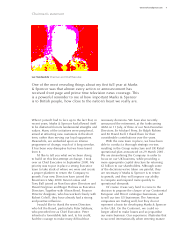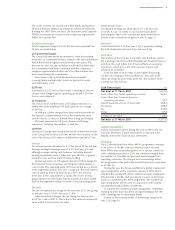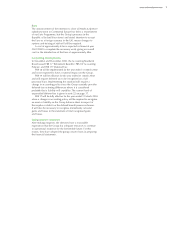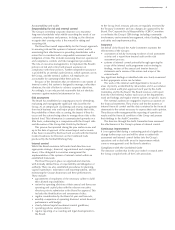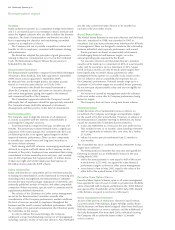Marks and Spencer 2001 Annual Report Download - page 8
Download and view the complete annual report
Please find page 8 of the 2001 Marks and Spencer annual report below. You can navigate through the pages in the report by either clicking on the pages listed below, or by using the keyword search tool below to find specific information within the annual report.
8Marks and Spencer p.l.c.
Corporate governance
The Group is committed to high standards of corporate
governance and has applied the Combined Code principles
as follows:
Directors
As at 31 March 2001 the Board comprises 12 directors,
seven of whom are non-executive. Since September 2000
when Peter Salsbury resigned from the Board as Chief Executive,
Luc Vandevelde has headed the Board as Chairman and Chief
Executive. The Board recognises that this is to address current
business needs and has balanced the power by:
• appointing Roger Holmes to the Board (1 January 2001) as
Managing Director of UK Retail;
• appointing two new non-executive directors (1 September
2000), Tony Ball and Kevin Lomax;
• having a majority of non-executive directors on the Board,
with a wide range of experience and expertise, who bring an
independent judgement on issues of strategy, performance
and resources;
• retaining 100% non-executive membership of the principal
Corporate Governance Committees (Audit, Remuneration
and Nomination).
A full list of the directors, along with their biographies and the
Board Committees on which they sit, is given on page 20 of the
Annual Review. Following the retirement of Sir Martin Jacomb
(17 July 2000) the non-executive directors nominated Brian
Baldock as the Senior Independent Director. Sir David Sieff is
not considered independent for the purposes of the Combined
Code because of his previously held executive position in
the Group.
All directors have access to the advice and services of the
Company Secretary, Graham Oakley, who ensures that the
Board, which meets at least eight times per year, receives
appropriate and timely information for its decision making, that
Board procedures are followed and that statutory and regulatory
requirements are met. He also assists the Chairman in ensuring
that all directors are properly briefed on issues arising at Board
meetings. Directors receive appropriate induction training when
they join the Group and coaching to develop individual skills
as required.
There is an established procedure whereby any director,
wishing to do so in the furtherance of his or her duties, may
take independent professional advice at the Group’s expense.
Under the Company’s Articles of Association, the nearest
number to but not exceeding one third of the Board shall retire
each year by rotation. The Board has resolved that all directors
are required to offer themselves for re-election at least every
three years and the Articles will be amended to reflect this
practice when they are next revised.
Principal Board committees
The Board has a formal schedule of matters reserved to itself.
The Board has delegated certain responsibilities to Board
Committees, which operate within clearly defined terms of
reference, reporting regularly to the Board and include:
Audit Committee: assists the Board in fulfilling its overview
responsibilities, primarily reviewing the reporting of financial
and non-financial information to shareholders, the systems
of internal control and risk management, and the audit
process. It comprises all the non-executive directors, is chaired
by Kevin Lomax and meets at least three times annually.
The external auditors and the Chief Internal Auditor attend all
meetings, which executive directors also have a right to attend.
In November 2000, the Financial Services division established
its own Audit Committee which meets three times a year, reports
regularly to the Financial Services Board and annually to the
Group Audit Committee.
The Audit Committee also keeps under review the
independence and objectivity of the external auditors.
The Committee reviews the nature and amount of non-audit
work undertaken by PricewaterhouseCoopers (‘PwC’) each
year to satisfy itself that there is no effect on their independence.
PwC are also subject to professional standards which safeguard
the integrity of the auditing role they perform on behalf of our
shareholders. Details of this year’s fees are given in note 3 on
page 25.
Remuneration Committee: ensures the executive directors
and senior management are appropriately rewarded, giving
due regard to the financial and commercial health of the
Group. It comprises all the non-executive directors except for
Sir David Sieff, is chaired by Dame Stella Rimington, and
meets at least five times annually. The Committee does not
retain remuneration consultants but seeks professional advice
as required.
Nomination Committee: keeps under review the Board
structure, size and composition; selects and proposes to the
Board suitable candidates for appointment as directors of the
Group, and considers Board successional plans. It comprises all
the non-executive directors, is chaired by Brian Baldock, and
meets as required.
Corporate Social Responsibility Committee: provides the
Board with an overview of the social and ethical impact of
the Group’s activities including community involvement,
environmental management and ethical trading. It comprises
two executive directors, one non-executive director and three
divisional directors, is chaired by Robert Colvill and meets at
least four times annually.
Directors’ remuneration
The Remuneration Report appears on pages 10 to 15 and
contains a statement of remuneration policy and details of
the remuneration of each director. The remuneration of non-
executive directors is determined by the Chairman together with
the other executive directors. The Board considers each year
whether shareholders should be invited to consider separately
the Remuneration Report at the AGM, and does not consider it
necessary at the 2001 AGM.
Relations with shareholders
The Group is committed to ongoing communication across its
entire shareholder base, whether institutional investors, private
or employee shareholders. This is achieved principally through
regular annual and interim reports, quarterly trading statements
and the AGM. The Group’s website at www.marksandspencer.com
contains corporate and customer information updated on a
regular basis.
Regular dialogue and presentations take place throughout
the year with institutional investors. The AGM held in July in
London is well attended by shareholders who receive a business
presentation and have the opportunity to ask questions of the
full Board including the chairs of the Audit, Remuneration and
Nomination Committees. The results of the proxy voting are
declared at the meeting and are published on the Group’s
website together with a resumé of the Meeting.

